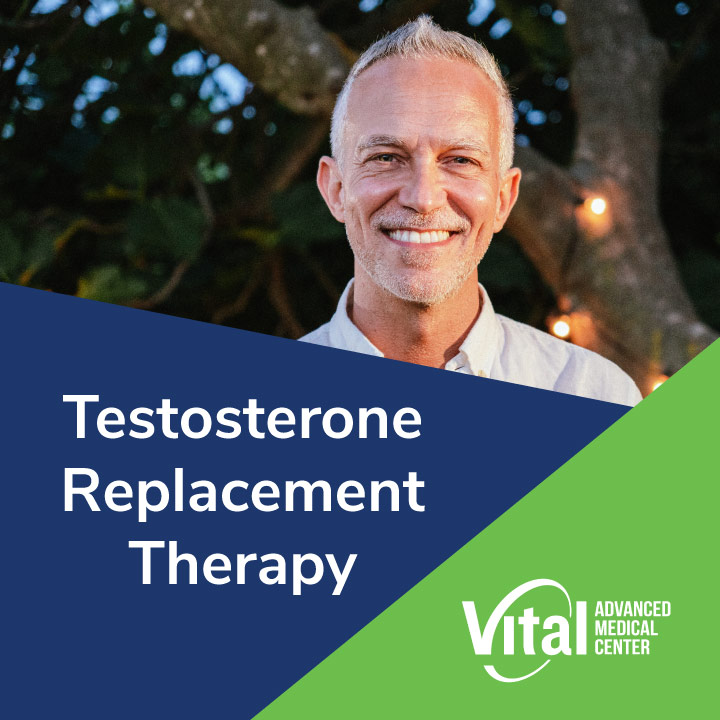
Lower testosterone levels are one of the signs of aging in men, and testosterone levels usually begin to drop starting in the 30s or 40s and gradually continues over time. This decline has impacts on a man’s health, some of which are detailed below.
Lower testosterone levels lead to reduced muscle mass and strength, increased body fat, and decreased bone density. These changes can affect overall physical health and contribute to conditions like osteoporosis.
Today we are inundated with commercials for erectile dysfunction and low libido. Testosterone plays a crucial role in libido (sexual drive) and erectile function. Declining levels of testosterone can lead to reduced sexual desire, erectile dysfunction, and decreased satisfaction from sexual activity. If you are a male and reading this, your enjoyment from sexual activity need not decline as you age.
Are you a man experiencing feelings of depression and irritability? Are you less motivated than when you were younger? Is your memory not that it used to be? Are your cognitive functions such as memory not as good? If so, it is possible that lower testosterone levels is the culprit.
There is also an impact on physical health as testosterone levels decline. Since testosterone affects metabolism, lower levels of testosterone can affect overall quality of life as men age, making them feel more fatigued or less energetic. Low testosterone is also associated with changes in cholesterol levels, insulin sensitivity, and an increased risk of developing type 2 diabetes.
Last but not least, low testosterone levels have been linked to increased risks of cardiovascular disease and other chronic conditions. However, it’s important to note that the relationship between testosterone and these conditions is complex and influenced by various factors.
What can a man do about low testosterone levels as he ages?
If a man experiences many of the symptoms related to low testosterone, the first step is to consult a healthcare provider. They might conduct tests to measure testosterone levels and discuss potential treatment options, which could include lifestyle changes, medication, or hormone replacement therapy.
Aging men experiencing low testosterone levels have several options to address this issue, ranging from lifestyle changes to low T treatments. Here’s some of the things you can do:
Make changes to your lifestyle.
Choose to exercise regularly with strength training and cardiovascular exercise. Engaging in resistance training such as weight lifting can help improve testosterone levels and muscle mass, while regular aerobic such as walking, biking, high intensity training activity can also support overall hormone balance and health.
Change your diet.
Consume a diet rich in lean proteins, healthy fats, and whole grains to support hormone production. Take adequate quantities of vitamins and minerals such as vitamin D, zinc, and magnesium, which play roles in testosterone production. Balanced nutrition plays an important role in maintaining testosterone levels.
Manage your Stress.
The use of stress reduction practices like meditation, deep breathing, and mindfulness can help lower cortisol levels, which can negatively impact testosterone.
Get Enough Sleep
Aim for 7-9 hours of quality sleep per night, as inadequate sleep can negatively affect hormone levels.
Avoid Excessive Alcohol and Quit Smoking
Excessive alcohol consumption and smoking can lower testosterone levels and impact overall health.
Manage any Underlying Health Conditions
Manage Chronic Diseases and conditions such as diabetes or obesity, which can impact testosterone levels. Treating these underlying conditions can help improve hormone levels.
Consider Testosterone Replacement Therapy (TRT)
At Vital Advanced Medical Center’s TRT Clinic in Tampa, our experienced men’s health providers go over a male patient’s general health, run tests and labs, check for symptoms of low testosterone such as low libido, a lack of energy, a decrease in strength or endurance, a “decreased enjoyment of life”, erectile dysfunction or erections that are less strong, falling asleep after dinner and so on.
After a thorough workup and the above steps, our providers will sit with you to weigh the benefits and potential risks and determine whether you are a candidate for testosterone replacement therapy. If you are, then Testosterone Replacement Therapy (TRT) can be administered through injections, patches, gels, or pellets to help restore normal testosterone levels. TRT should be discussed with a healthcare provider to weigh the benefits and potential risks.
Regular monitoring and consultation is a must. We like to see our testosterone replacement therapy (TRT) patients regularly to monitor hormone levels via blood tests and adjust treatment as needed.
Taking a multifaceted approach that includes lifestyle changes, medical treatments, and regular monitoring can help manage low testosterone levels effectively. Always consult with a healthcare provider to determine the most appropriate strategy based on individual health needs. If you are a man struggling with low testosterone levels or suspect that you are then visit our offices to find out more about Testosterone Replacement Therapy in Tampa.

